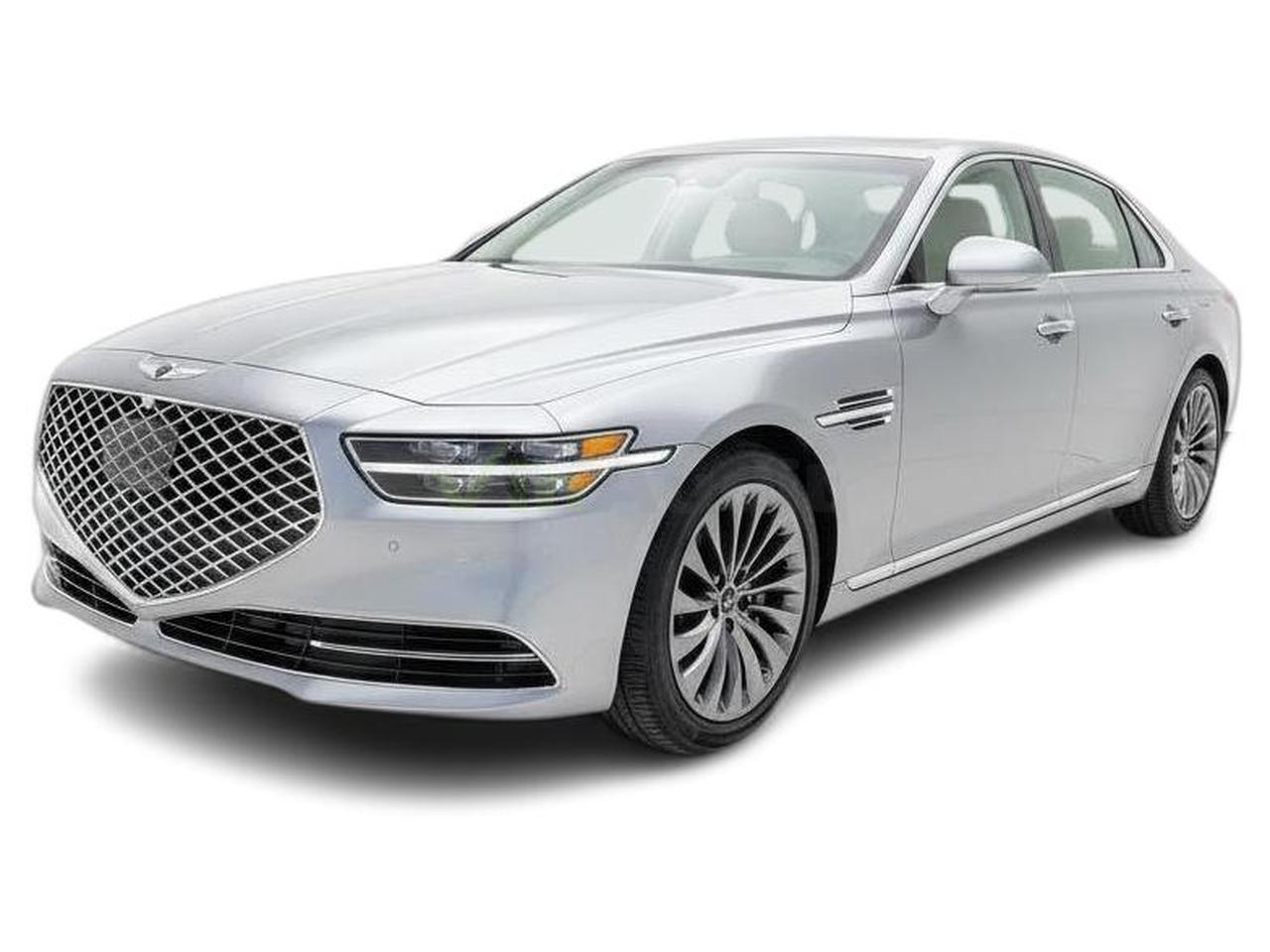The 2020 Genesis G90 is a full-size luxury sedan representing Genesis's commitment to challenging established luxury brands. It's a 4-door sedan, part of the first generation G90 (2017-2022). Key trims include the 3.3T Premium and the 5.0 Ultimate. The pricing range typically started around $73,000 and could reach over $77,000, depending on options. It stands out due to its exceptional value proposition, offering a wealth of features and a luxurious experience at a lower price point than many competitors. Its elegant design and comfortable ride also contribute to its popularity.
The Good
The 2020 Genesis G90 offers strong performance from its available engines, coupled with impressive reliability ratings. Its luxurious and comfortable interior, combined with an elegant design, appeals to emotional buyers. Practical buyers appreciate its excellent value for money, comprehensive warranty, and user-friendly technology, despite its average fuel efficiency.
The Bad
While generally reliable, the 2020 Genesis G90's weaknesses include its somewhat bland driving dynamics compared to sportier rivals. The infotainment system, while user-friendly, might feel slightly dated compared to newer systems. Also, the rear seat, while spacious, doesn't offer as many advanced features as some competitors. Fuel economy is not a strong point.
2020 Genesis G90: Quick Overview
- Engine Options:
- 3.3L Twin-Turbo V6: Standard on Premium trim.
- 5.0L V8: Standard on Ultimate trim.
- Horsepower:
- 3.3L Twin-Turbo V6: 365 hp
- 5.0L V8: 420 hp
- Fuel Economy (EPA Estimated):
- 3.3L Twin-Turbo V6: 17 mpg city / 24 mpg highway / 20 mpg combined (RWD) & 17 mpg city / 24 mpg highway / 20 mpg combined (AWD)
- 5.0L V8: 16 mpg city / 24 mpg highway / 19 mpg combined (RWD) & 15 mpg city / 23 mpg highway / 18 mpg combined (AWD)
- 0-60 Times:
- 3.3L Twin-Turbo V6: Around 5.7 seconds
- 5.0L V8: Around 5.3 seconds
- Towing Capacity: Not recommended or rated for towing.
- Trim-Level Features:
- 3.3T Premium: Leather upholstery, heated and ventilated front seats, heated rear seats, power-adjustable rear seats, a 12.3-inch infotainment screen, Apple CarPlay and Android Auto, a 17-speaker Lexicon sound system, adaptive suspension, sunroof, and a full suite of safety features (adaptive cruise control, lane keep assist, blind-spot monitoring, rear cross-traffic alert, and automatic emergency braking).
- 5.0 Ultimate: Includes all features of the 3.3T Premium plus upgraded leather, rear-seat entertainment system with dual 10.3-inch screens, power-adjustable rear seats with memory settings, and illuminated vanity mirrors.
2020 Genesis G90 Specifications
Vehicle Information
| Year | 2020 |
| Make | Genesis |
| Model | G90 |
| Trim | - |
| Style | - |
| Type | - |
| Category | - |
Manufacturing Details
| Made In | - |
| Manufacturing City | - |
Dimensions
| Doors | - |
| Curb Weight | - |
| Gross Vehicle Weight Rating | - |
| Overall Height | - |
| Overall Length | - |
| Overall Width | - |
| Wheelbase Length | - |
| Standard Seating | - |
Engine & Performance
| Engine | - |
| Engine Size | - |
| Engine Cylinders | - |
| Transmission | - |
| Transmission Type | - |
| Transmission Speeds | - |
| Drivetrain | - |
Additional Features
| Anti-Brake System | - |
| Steering Type | - |
Pricing
| Manufacturer Suggested Retail Price (MSRP) | - |
| Invoice Price | - |
| Delivery Charges | - |
Vehicle History Report
Vehicle
Specifications
Specifications
Ownership
History
History
All History
Events
Events
NMVTIS Title
History Check
History Check
Salvage/Rebuilt
Check
Check
Accident
Check
Check
Theft
Check
Check
Open Lien
Check
Check
Past Sale
Listings
Listings
Safety
Recalls
Recalls
Odometer
Check
Check
Market Price
Analysis
Analysis
What Problems Does the 2020 Genesis G90 Have?
The 2020 Genesis G90 generally enjoys good reliability ratings. However, some owners have reported minor issues, primarily related to the infotainment system, such as glitches or slow response times. Others have noted concerns with the adaptive cruise control system malfunctioning occasionally. Specific to the 2020 model, reports are less frequent than earlier model years, suggesting improvements in build quality. There have been recalls, but they were related to industry wide issues. For example, some G90 models might have been included in recalls concerning possible fuel leaks or brake system malfunctions, depending on manufacturing dates and specific components used. It is important to check the NHTSA (National Highway Traffic Safety Administration) website for the most up-to-date recall information using the VIN of the specific vehicle in question. Long-term reliability concerns are relatively minimal given the car's age, although some owners have mentioned potential issues with the air suspension system as the car ages and the components begin to wear down. Regular maintenance, particularly fluid changes and inspections of the suspension and braking systems, are crucial for mitigating potential issues. Early detection is key to preventing more costly repairs down the line. Overall, the G90 has shown to be fairly reliable.
How long will the 2020 Genesis G90 last?
With proper maintenance, a 2020 Genesis G90 can easily provide 150,000 to 200,000 miles or 10-15 years of service. Owner data suggests that regular oil changes, timely servicing of the transmission and cooling systems, and addressing minor issues promptly are key to longevity. Long-term durability concerns might revolve around the air suspension system, which can be prone to leaks or component failure over time, and the electronic components, given the complexity of the infotainment and driver-assistance features. Preventative maintenance and diligent care will extend the vehicle's lifespan.
What Technology & Safety Features are Included?
The 2020 Genesis G90 boasts a comprehensive suite of technology and safety features. The centerpiece is a 12.3-inch infotainment screen with navigation, Apple CarPlay, and Android Auto integration. The standard 17-speaker Lexicon sound system provides an immersive audio experience. Driver-assistance features are abundant and include adaptive cruise control, lane keep assist, blind-spot monitoring, rear cross-traffic alert, driver attention warning, and automatic emergency braking. These systems work seamlessly to enhance safety and reduce driver fatigue. Optional features include a rear-seat entertainment system with dual 10.3-inch screens, allowing rear passengers to enjoy multimedia content. The G90 also offers a 360-degree surround-view monitor for easier maneuvering in tight spaces. Safety is a priority, and the 2020 Genesis G90 generally performs well in crash tests. The IIHS (Insurance Institute for Highway Safety) typically awards the G90 with high scores, and the NHTSA provides star ratings for overall safety performance. These tests evaluate the vehicle's ability to protect occupants in various types of collisions. The G90 is designed with advanced safety technologies and a robust structure to ensure passenger safety.
What Colors Options are Available?
Exterior Colors
Uyuuni White
Savile Silver
Gold Coast Silver
Adriatic Blue
Porto Red
Vik Black
Lima Red
Interior Colors
Marble White
Obsidian Black
Dune Beige
Bordeaux Brown
Brown/Brown
2020 Genesis G90 Prices and Market Value
When new, the 2020 Genesis G90 started around $73,000 for the 3.3T Premium trim and reached upwards of $77,000 for the 5.0 Ultimate. Current used market prices generally range from $35,000 to $50,000, depending on mileage, condition, and trim level. The G90 experiences significant depreciation, partly due to its brand recognition compared to established luxury competitors. Factors affecting resale value include the car's condition, mileage, maintenance history, and geographic location. Models with lower mileage and a clean history command higher prices. The comprehensive warranty offered by Genesis somewhat mitigates depreciation concerns for some buyers.
2020 Genesis G90 Cost of Ownership
The 2020 Genesis G90 tends to have moderate insurance costs, slightly lower than some of its pricier European rivals. Fuel costs are average for its class, reflecting its engine size and performance. Maintenance costs are generally reasonable, particularly with Genesis's included maintenance program. Repair costs can be higher for specialized components like the air suspension. Long-term ownership costs are generally moderate, making it a less costly option than some other high-end luxury sedans, but not economical in the general sense.
2020 Genesis G90 Fuel Efficiency
Fuel Type
-
Fuel Capacity
-
City Mileage
-
Highway Mileage
-
2020 Genesis G90 Safety Rating
NHTSA
2020 Genesis G90 Insurance
Insurance for a 2020 Genesis G90 is moderately priced, reflecting its status as a Vehicle with strong safety ratings and
reasonable repair costs.
reasonable repair costs.
How Does the 2020 Genesis G90 Compare to Other Vehicle?
The 2020 Genesis G90 competes with luxury sedans like the Mercedes-Benz S-Class, BMW 7 Series, Lexus LS, and Audi A8. In terms of performance, the G90 offers respectable power but lacks the outright athleticism of the BMW 7 Series or the advanced technology of the Mercedes-Benz S-Class. Feature-wise, the G90 provides a wealth of standard equipment, rivaling its competitors at a lower price point. Reliability is generally strong, comparable to the Lexus LS and potentially better than some European models. Price is where the G90 truly shines, offering significant value. The Lexus LS is a similar alternative, prioritizing reliability and comfort over sporty handling. The BMW 7 Series offers a more engaging driving experience but at a higher cost. The Mercedes-Benz S-Class is the benchmark for luxury and technology but commands a premium price. The Audi A8 offers a blend of luxury, technology, and performance. Whether the G90 is better depends on individual priorities. If value and a comfortable ride are paramount, the G90 is a strong contender. If performance or brand prestige are more important, alternatives may be preferable.
Ranks #1420 Sedan
| 1 | 2023 Toyota Camry | (5.0★) |
| 2 | 2023 Honda Accord | (0.0★) |
| 3 | 2023 Lexus ES | (0.0★) |
| 4 | 2024 Subaru Legacy | (5.0★) |
| 5 | 2022 Mazda MX-30 | (4.0★) |
| 6 | 2024 BMW M3 | (0.0★) |
| 7 | 2023 Ford Mustang | (5.0★) |
| 8 | 2023 Mercedes-Benz AMG GT | (0.0★) |
| 9 | 2023 Audi A3 | (0.0★) |
| 10 | 2023 Chevrolet Camaro | (5.0★) |
| 11 | 2023 Hyundai Elantra Hybrid | (0.0★) |
| 12 | 2023 Nissan Altima | (4.0★) |
| 1420 | 2020 Genesis G90 | (0.0★) |
Final Verdict: Is the 2020 Genesis G90 a Good Vehicle?
The 2020 Genesis G90 is ideal for buyers seeking a luxurious and well-equipped full-size sedan without paying the premium price of established luxury brands. It's a strong choice for those who prioritize comfort, value, and a comprehensive warranty. Whether it's worth buying depends on individual needs and budget. A used 2020 G90 represents excellent value, offering significant savings compared to buying new. The 3.3T Premium trim provides the best balance of features and affordability. However, if rear-seat entertainment is a must, the 5.0 Ultimate trim may be worth the upgrade. If brand prestige and ultimate performance are priorities, alternatives like the Mercedes-Benz S-Class or BMW 7 Series might be a better fit. Ultimately, it is worth buying for the right customer.

